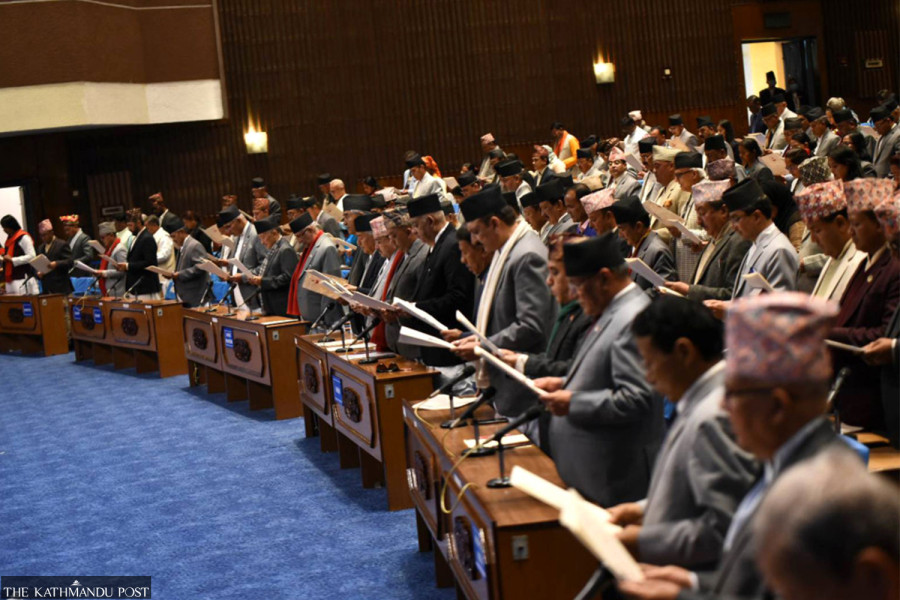Politics
House members sworn in
Article 88 of the constitution requires every member to take an oath before first attending a meeting of Parliament or its committees.
Nishan Khatiwada
Chilly weather had engulfed Kathmandu on Thursday, well before noon. The federal parliament building in Baneshwar, however, was heated up, so to speak, awaiting the arrival of newly elected lawmakers to take their oaths of office and secrecy.
The oath ceremony was scheduled for 1pm. Lawmakers of all stripes—new and inquisitive as well as seasoned ones—entered the Parliament building for the swearing-in ceremony, to embrace their legislative duties for the next five years. They reached Parliament with their certificates of election, some proudly flaunting them to the dozens of cameras on standby.
As the ceremony got underway, Pashupati Shumsher JB Rana, who at 81 is the oldest member of the House of Representatives, stepped into the rostrum to recite the oath that was to be repeated by the incoming people’s representatives. Rana had assumed office at the Federal Parliament Secretariat after taking the oath from President Bidya Devi Bhandari at Sheetal Niwas on Wednesday. He will now preside over the lower house until the Speaker is elected.
Prior to the ceremony, Federal Parliament Secretariat General Secretary Bharat Raj Gautam had summoned a meeting and briefed the newly elected members of the lower house on the procedures. Some members took the oath in their mother tongue.
As many as 270 lawmakers participated in the event. Four lawmakers—Prem Ale from CPN (Unified Socialist), Mahindra Raya Yadav and Ram Kumar Rai from CPN (Maoist Centre) and Maya Rai from the Nepali Congress—were absent from the ceremony, informed Dasharath Dhamala, assistant spokesperson for the Federal Parliament Secretariat.
Nepal’s laws make it mandatory for elected lawmakers to take their oaths of office before joining the parliamentary process.
Article 88 of the constitution states that every member of parliament should take an oath as provided in the law, before first attending a meeting of Parliament and its committees.
Likewise, Section 75 of the House of Representatives Election Act, 2017 also requires newly elected lawmakers to take their oath.
As many as 12 political parties and five independent candidates have been elected to the House of Representatives from last month’s polls.
Of them, three parties—Rastriya Swatantra Party, Janamat Party and Nagarik Unmukti Party—made it to the Parliament in their first attempt.
Many new faces elected to the lower house is a good sign for democracy, experts say.
Krishna Khanal, an analyst who taught political science at Tribhuvan University for over 30 years, said the emergence of new parties and new lawmakers in Parliament reflects people’s desire for change amid a political landscape dominated for long by the Nepali Congress and the Communists. Khanal added he hopes that the new ruling coalition and the opposition in the lower house would remain stable throughout the five-year term of the government.
“The value of the parliamentary system and an effective role of the opposition have been neglected for a long time,” Khanal said. “There’s a perception in Nepali politics that the parliament is merely for making and breaking the government. It would be a big achievement if the current parliament can restore its lost purpose.”




 14.24°C Kathmandu
14.24°C Kathmandu














